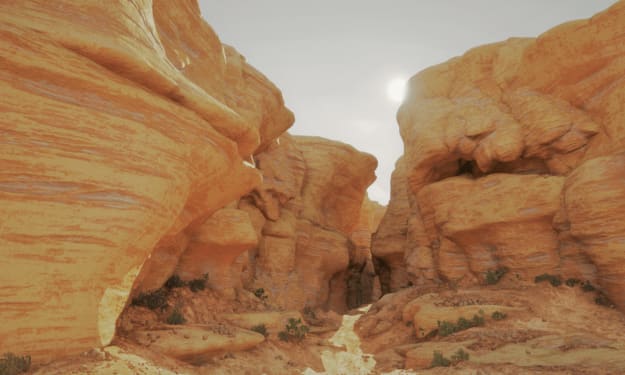LEFT
Panic Is a Fine Condiment

There is a strange sadness in a spent forest. It is a kind of forgetting that eats the means of recollection. Only humans can make a mistake like this, and fire is the right reminder. Taking until the giver cannot spell harvest is folly.
The trouble is that haste can blot out the difference between the dying and the dead. I did not want to burn the womb while there were still children, however miserable and stumbling, still waiting in its sighing shadows. So, I hunted in the dying forest still, knowing that soon, the whole thing would have to be blotted for good, like a promising story that spoils and needs scratching before anything strong can take its place.
I was over the western hill, one stubborn tree and a ruined church of stones muttering lies to each other under my circling, when the whelp made a raw sound. I am old enough to admit that it made my skin, which has laughed at a legion of insults and injuries, twitch.
Most of the time, when your whelps make a sound, it is mouth-watering: they are always convinced that they are in distress, because they are not acquainted with genuine danger or pain, but under that constant complaint about everything failing to be the safe, salty insides of their mothers, there is always the gloating of growth. They know that, given time and food and rest, the drop will become the torrent, and the will that yields will become the will that commands. How they know this I do not know, but all throbbing things do. Even a tree knows it is closer to the sun than it used to be, and even something like you smells its pride before you get on with humbling it for the sake of yours. Vulgar vitality makes vivacious victuals. Your kind knows it as well as anything with teeth. You save the devouring, as a rule, for other things’ offspring. You think this is one of the things that makes you better than your food.
The noise the whelp beneath me made was not in tune with those rude, familiar sounds. It was a sound that was embarrassed and angry to be one and it seemed to signify that silence ought to ignore it, save for the anguish that needed surrender into the twilit air. So, I did twitch, and turn, the better to get a look at the instrument that had produced such ugly, strong music. It was under the tree, a clot of grey rags, save for the pink spot that turned toward me and did the spotting. It made the sound again, and its limbs disagreed as to their next move. Coordination is just the consensus of your corporeal parts. All of mine have known for longer than you have known how to read that my gut is their lord and my mouth his high priest. The whelp’s legs weren’t sure they weren’t arms.
I put my feet beneath me and moved slowly toward it, as one might something that seems tasty but unwilling to let you make sure. I heard some other forms of life—such as they were—deeper in the dwindling trees notice the whelp and discuss the meal to come. I turned an eye on them with deliberate precision and they formed a sweaty, slavering queue at my back. You get used to this sort of thing after a century or two, but it’s important to savor the morsels: when you kill in a way that makes immature or inept killers ashamed of their artless fumbling, they just stop trying until you’re through. Your poets have this effect when they know what they are doing. The rest of you hear the words that plod and shuffle out of your mouths sashay and pirouette out of a poet’s mouth and it makes you bashful. There were no serious animals in that broken forest, so my joy at eclipsing them with a glance was small, but so was the whelp, and it had changed my course.
The whelp made a third, awful noise. Then it did something that surprised even the stones around it.
Rare are those of your kind who know the soundless speech. It is not something learned. It is something every other kind knows and yours forgets. As soon as you get on with the business of clothing your naked lives in letters, it leaves you. But a few reel back, usually shoved by doubt and pain, into the eloquent stillness. It couldn’t speak yet, being a mere whelp, but the stubby fingers of its mind poked mine with one thing: “LEFT.”
Much as I’d twitched above, without wishing it, I turned that way—leftward--and looked. Silliness is not the exclusive privilege of the young. The sky was an ember at its summit and ashes beneath. A bored crow shrugged on the western horizon. I could smell the fur of the sulking things behind me and hear the moon whispering old puns. The hunger behind me writhed. The soundless speech wasn’t a crude map—it was an indictment, I thought. Your kind had given this whelp the ugly hill in the forest you’d eaten to the rind as its last nurse.
You probably believe that pity and things like me are strangers. You are so young. If fire is at home in you and hunting is to you as catching is to claws, you become a professor of pity. Reaching into the heart of the thing you are chasing to know just how well you are teaching it to fear you is probably the sweetest and most edifying part of finding food.
I pitied the whelp. I asked it why they had gone, so quietly that the bored crow that was just an apostrophe on the page of the western sky heard me.
“CRUEL,” came the reply. That is as likely as anything to be the epitaph of human beings. I can’t even take to the fetid air through which you soar in that regard.
I studied the hill. They were graceless and starving, those who had left the whelp here, so the traces of their motion were jagged and italicized. A parody of a village was a wing or two south, between a stupid, gossiping river and a bog. That is where they had gone after dropping the whelp here. They’d made signs around it and burnt something they thought was important. The eldest one, no doubt, had solemnly said things to beings who had better things to do. It was cursed, the whelp.
I nodded. Some of the twitching fools behind me thought that meant feeding was imminent and were all froth. I turned from the whelp and spoke another language to one of the trees. I convinced it to frighten the gaunt gaspers in the remains of the forest by trying to do what I was made to: contain fire. You’ve seen torches before. Panic is a fine condiment.
When I turned back to the whelp there were flecks of wisdom in its wet eyes. The burning tree made them legible. It wanted me to do what it could not. It was big enough to contain an appetite for revenge.
It can be delicious to obey the smallest things when you dwarf their aspirations. I took to the air, sailed southward and fell on the pathetic village like a crimson, scalding autumn. I spared their animals (how nutritious and delicious would you be, had you been kept by beings not worth keeping?) and I ate those on two legs I could find. I saved the old fool for last—the botherer of gods. He tasted like cheese that thought it was still milk. I summarized all the structures in soot and ash, all in the name of the nameless whelp. The river started gossiping with new zeal about the destruction of the vile village. The bog replied with flatulent confusion. For the first time in a decade, I smiled.
I returned to the hill. I told the whelp, in its miniscule head, that they had left it because they had not understood it. I mulled a little genealogy of fear, but I was full, and the whelp wouldn’t have enjoyed the daintiest bits.
“ALONE,” was its reply. The tone was distinct from the one its other, sonorously silent sentiments had been sheathed in. Precocious resignation was there. For the third time that day, the unfamiliar unfurled. That is the only reason I am giving this tale to one such as you. If you knew what strange, abandoned things occasionally reveal, you would be ashamed of the paltry things you make, with all of your warm advantages to brag about.
“WE ARE,” I thought to it, and took it up. It’s on my back now.
Just look.
It wants to talk to you, as you are the only one from the hill I haven’t eaten.
You’re cruel.
Panic.
About the Creator
D. J. Reddall
I write because my time is limited and my imagination is not.
Enjoyed the story? Support the Creator.
Subscribe for free to receive all their stories in your feed. You could also pledge your support or give them a one-off tip, letting them know you appreciate their work.






Comments
There are no comments for this story
Be the first to respond and start the conversation.
This comment has been deleted